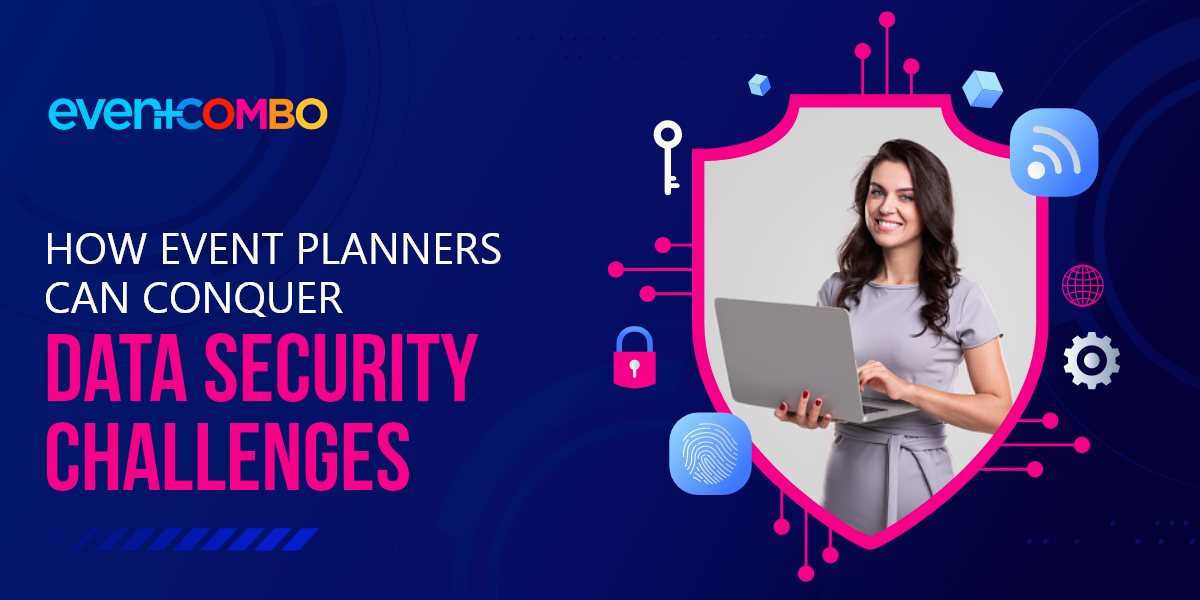

Protecting personal information has become the need of the hour with the profusion of event technology. The events industry collects a staggering volume of information. If it is not properly maintained and processed, the possibility of breaches increases significantly. Therefore, planners must prioritize event data security and implement measures that ensure a safe and secure experience.
This blog explores the importance of event data security, providing crucial insights into data-resilient event planning.
Why Data Security Matters for Event Planners?
Event planners process a large amount of personal data, such as name, personal details, payment details, dietary preferences, location, and more. They get all the attendees’ information through event management, registration, and engagement platforms. Naturally, all the information needs to be safeguarded.
Unauthorized access to such data can lead to a potential breach of sensitive information. attendee data can also get lost, stolen, or compromised if measures are not taken to secure it.
In addition, there has been a growing trend of data breaches, which have been continually evolving. Increasingly sophisticated cyberattacks pose new challenges for corporates. According to the latest studies, IT services and software sector have faced the greatest brunt of security breaches.
So, planners need to take measures against unauthorized access and ensure that they have a well-defined incident response
Data security in event management thus encompasses a set of practices that event planners should follow to preserve the sensitive details of their attendees. By being compliant with the General Data Protection Regulation (GDPR), using event technology that offers end-to-end encryption, educating their team members, and preparing for data breaches, planners can easily navigate the complex security landscape and preserve the data as well as the trust of their audience.
Discover Eventcombo’s fully compliant event technology designed for secure event planning, ensuring loyalty from your attendees, sponsors, and vendors alike.
GDPR and Event Data Security - What Planners Should Know
According to GDPR, personal data should be processed only with the active consent of people. Event planners should seek the consent of attendees for activities like printing name tags, sharing the contact information of attendees with sponsors, using the headshots of speakers, and sending promotional and marketing materials to the audience.
In addition, the settings of cookies on the website should also be modified to seek consent of the reader.
Event planners should process personal data only if they have a legitimate basis for the same. So, during events, activities like name tag printing, speaker promotion, clicking photos of guests, and analyzing their personal data, should not be done without a proper reason or legitimate interest.
GDPR regulations to manage and protect participants' personal data can be complex and time-consuming. However, not handling sensitive information properly will lead to serious consequences and damage your reputation. Nobody is immune to GDPR fines if they don't handle the private information of their customers properly. This is aptly seen in the whopping $1.2 billion fine on Facebook owner Meta in May 2023 by Ireland’s Data Protection Commission.
Explore this comprehensive guide to GDPR-compliant event planning. Equip yourself to navigate through the challenges posed by the new regulations effectively.
How do Event Management Systems Help You with Data Security?
The extensive scope and intricacy of the GDPR have posed significant challenges for many companies striving to safeguard and handle information as required. Nevertheless, event technology providers have emerged as a beacon of hope by offering systems equipped with robust features designed to facilitate compliance management.
An event tech platform has several features to protect attendee data and process it legally which includes:
Role-Based Access Controls (RBAC)
RBACs in event tech allocate specific roles and permissions to varying groups of people- organizers, administrators, and attendees. When only authorized individuals can access specific data, the risk of data breaches decreases.
Soc 2 Type I and Soc 2 Type II Certifications
Soc 2 Type I and Soc 2 Type II Certifications show that the company uses compliant systems. Further, the certifications are evidence that the personal and private data of guests are stored and processed securely.
Safe Payment Processing
An event management system can be trusted to securely process payments when it follows Payment Card Industry Data Security Standard (PCI DSS) guidelines. It guarantees the safety of event registration platforms.
GDPR and CCPA Compliance
Event management systems have features for planners to seek proper consent for collecting attendee information and providing them with clear privacy policies. The systems encrypt data with 256-bit Advanced Encryption Standard (AES) and allow rectifying personal data at any time.
Strong Data Backup Features
The vast range of data like attendee information, ticket data, and real-time event feedback makes it imperative to ensure its safety. Also, as event success depends heavily on data integrity, even a small loss of such valuable information can be devastating. It's why robust event management platforms have data backup features like easy import and export data, redundancy measures to lower downtime, and periodic data updates.
How Event Planners Should Act in Case of a Data Breach
Reliance on digital and cloud-based platforms has increased with the shift to virtual and hybrid events. As mentioned at many points before, data breaches by cybercriminals have resulted in many cases of unauthorized access to confidential data. Event planners should thus have a strong plan to combat data breaches. It includes the following steps:
Summing up
Protection against data breaches and ensuring GDPR compliance have become non-negotiable for event planners. Its importance is rising as the world becomes more digital and the rising popularity of different formats of events. Securing the active consent of customers, lawful data processing, and having a strong incident response plan will help you stay ahead of the complex event security landscape. Additionally, investing in event technology with measures to protect participants' personal data will help enhance the security posture of your events.
Eventcombo's all-in-one event management platform has all the features to enable compliance and protect your valuable event data. If you are ready to create better and secure events through it, book a demo today.

Every event organizer knows the sinking feeling of watching a well-planned budget unravel. That initial estimate of $400,000 suddenly balloons to $540,000 due to unexpected fees and overlooked expenses.

Eventbrite is a common name in the event management space, but if you’re here, chances are it isn’t checking all your boxes. Like many professionals, you may be looking for Eventbrite alternatives or exploring...

Networking events remain the backbone of professional growth, whether you're building a business, recruiting talent, generating leads, or seeking strategic partnerships.